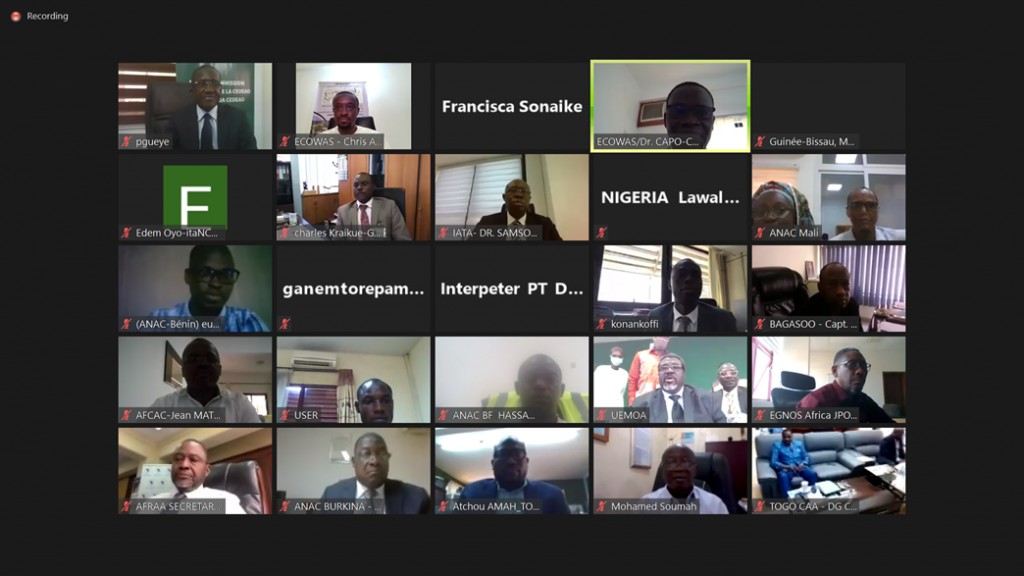|
ECOWAS air transport and finance ministers consult on making affordable air travels through a common regional policy on aeronautical charges, fees and taxes as well as a business plan for the establishment of a regional aircraft maintenance facility

The Ministers in-charge of Air Transport with their Finance colleagues met have agreed to take the necessary steps to progressively reduce and eventually eliminate burdensome taxes and charges contributing to the high cost of air transportation in the region.
The meeting was called by the ECOWAS Commission as part of measures to make air transportation in the West Africa Region more affordable to users in line with regional efforts to in-crease intra-regional trade, place ECOWAS member States in readiness to benefit from trading under the AfCFTA as well as the enhance the free movement of persons.
Welcoming Honorable Ministers to the Meeting on held on Wednesday 26th May 2021 and, the Commissioner for Infrastructure of the ECOWAS Commission, Mr. Pathe Gueye, highlighted the several challenges being faced by the Air Transport industry in the ECOWAS Region, which makes it very non-competitive on the continental and international market. Among other rea-sons, he said contributory factors are high cost of flight tickets resulting from excessive taxes by governments, charges and fees which leads to high operating costs of airlines; safety & security concerns; inadequate air connections between the capitals and major economic centers of ECOWAS Member States; lack of cooperation between regional airlines as well as with major international airline alliances, non-conducive environment for the liberalization of the air transport market; and difficulties in accessing finance for airlines and air transport projects.
The Commissioner said, in line with the ECOWAS regional priority to ensure the implementation the Yamoussoukro Decision and the Single African Air Transport Market (SAATM), a key initiative under the Africa Agenda 2063, which aims to further enhance the implementation of the Yamoussoukro Decision which seeks to progressively eliminate all non-physical barriers in the industry, including those linked to the granting of traffic rights, frequencies and capacity of air services has been implementing a modest number of initiatives with Member States.
He ended by intimating that, in accordance with the regional priority of enhancing free movement of persons and goods, the ECOWAS Commission commissioned two studies to investigate the pricing structure of ECOWAS Airlines with an objective of developing a regional policy to advocate for a transparent pricing structure in line with the principles of the International Civil Aviation Organization (ICAO) which is “States are encouraged to incorporate the four key charging principles of non-discrimination, cost-relatedness, transparency and consultation with users, in their national legislation, regulation or policies, as well as in their future air services agreements, in order to ensure compliance by airport operators and air navigation services providers”, and also the feasibility of establishing a major regional aircraft maintenance facility with an objective to help reduce the operating cost of airlines who resort to facilities in East African, Europe and Asia for their aircraft repairs.
Some key findings from the study showed that on the average, each ECOWAS Member State collects about 12 different taxes and charges. Also, in comparison to other regions in Africa, the Americas, Asia and Europe, the ECOWAS zone collects on average aeronautical charges and government taxes which are about 1.05 times higher than those charged in East Africa. Also, the Region has the most expensive aeronautical charges and government taxes at for regional flights, which are 85% above average and 2.97 times higher than those charged in the cheapest area of North Africa, while being the most expensive for an international flight which are 82.6% above average and 3.31 times higher than those of North Africa.
Commenting on the study findings, the Ministers in-charge of Air Transport, unanimously agreed that the West African air transport industry is less competitive and has been further compounded by the impact of the COVID-19 pandemic. They assured of their commitment to support urgent efforts to ensure that the industry operates competitively on the continent and beyond.
The Ministers approved of the establishment of a Special Task Force to review the study findings, measures being considered at the African Union level, and peculiarities of the region and propose an implementation plan on the progressive reduction of taxes, fees and charges as well as other related reforms in line with international best practices in the Air Transport industry.
The Task Force will be supported by the African Union, AFCAC, ICAO, IATA, UEMOA, BAGASOO, AFRAA, AfDB and all other relevant bodies.
The Meeting also witnessed keynote statements by the Commissioner for Infrastructure and Energy of the African Union Commission, H.E. Dr. Amani Abou-Zeid, and the Chairman of the Committee of ECOWAS Ministers in-charge of Air Transport, Honorable Kweku Ofori Asiamah, Minister of Transport of the Republic of Ghana. Both speakers recognized the challenges being faced by the Air Transport industry in West Africa and on the Continent as a whole and expressed their appreciation for the opportunity provided by ECOWAS to meet and consider solutions to the issue which has the pottential of hindering the implementation of the African Continental Free Trade Area (AfCFTA) Agreement.
Conclusing the meeting, the Ministers adopted a Communique which directed the formation of the Task Force with a working deadline of four (4) months from June 2021. They tasked the ECOWAS Commission to coordinate the work of the taskforce and report back in September 2021. The Ministers also requested ECOWAS to commence the next phase of the regional air-craft maintenance facility study of project structuring, transaction advisory towards financial close, while considering current market trends, industry needs and peculiarities of the Airline industry post COVID-19 as well as emerging requirements for aircraft maintenance in the region. Based on the feasibility and financing studies, ECOWAS will embark on intense project finance mobilization with development partners and private sector investors, for the Regional Aircraft Maintenance facility.
|




